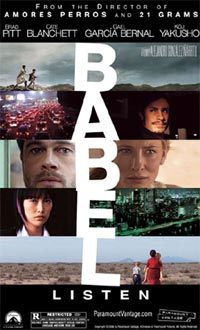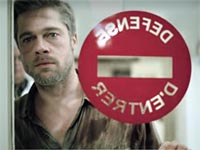Holiday Trifecta: "Letters From Iwo Jima," "Notes on a Scandal," "The Good Shepherd"
Maybe it's because it's that time of year when we celebrate giving and empathy for those less fortunate; maybe it's because such sincerity demands an ironic, clear-eyed counterbalance of tragedy and misery; or maybe it's just because it's the stretch run of Oscar season. But for whatever reason, the holidays have become home to grim dramas with statuette aspirations. For every Happy Feet or Charlotte's Web there's a solemn parable about lives wasted and lost, or a "human" story in which humans are picked at and exposed, like scabs.
So with my parents and brother in town for the holidays, we did what any family unit would -- hit the local cineplexes for what promised to be the latest round of dolor and (fingers crossed) intelligent storytelling, something to make us feel good about feeling bad. Did we receive what was promised? Read on.
Letters From Iwo Jima (2006, Dir. Clint Eastwood)
 |
-- General Tadamichi Kuribayashi, Letters From Iwo Jima
The moment Clint Eastwood chomped on a cigar, indiscriminately dispatched his first baddie, and pocketed his first fistful of dollars in Sergio Leone's spaghetti westerns, he pioneered a new kind of anti-hero: disdainful of convention, self-interested, and yet inextricably linked to society-at-large. His Man With No Name may have been inspired by Toshiro Mifune's Sanjuro from Kurosawa's Yojimbo, but while Sanjuro was a rueful free spirit, bah-humbugging any attempt to bring him into the fold, Eastwood's heroes are often tied to the law -- they may use it for their own ends (bounty dollars for criminals), they may perptuate the system even as they grow sick of its inadequacies (Dirty Harry and The Gauntlet), or they may talk themselves into imparting the law where it dare not show its face (Unforgiven) -- but justice of a sort is always served.
Eastwood's recent films as a director have further mined these depths. Unforgiven wanted to have its cake and eat it, too (Bill Munny is a truly irredeemable character, but isn't he a badass at the end?) -- ditto for Mystic River, which concludes with a vigilante act that is indefensible and unpunished, and Million Dollar Baby, which posits euthenasia as the last refuge of the Hemingway-esque tough guy. Some see subversive commentary on the Eastwood anti-hero in these works, while others might see the emperor dressed in new clothes.
So here comes Letters From Iwo Jima to further muddy the evidence -- in a bold move, avowed Republican Eastwood has made a film about the enemy! Based on the events of those fateful weeks on Iwo Jima back in 1945, the film follows the Japanese forces under the command of General Kuribayashi (Ken Watanabe) as they carry out their last-ditch stand against the Americans. Iris Yamashita and Paul Haggis's screenplay is resolutely old-fashioned in its approach, focusing on several characters in this desperate outfit: the weary Saigo (Kazunari Ninomiya), a mild-mannered baker who isn't as gung-ho about sacrificing himself as his superiors would like him to be, the by-the-book Shimizu (Ryo Kase), an upright soldier who doesn't question orders but isn't as impervious as one might expect, the genial Baron Nishi (Tsuyoshi Ihara), an equestrian legend who is more "Americanized" than the rest, and Lt. Ido (Shido Nakamura), the inflexible diehard who is all too willing to throw the lives of his soldiers away, as well as his own. Presiding over them all is General Kuribayashi, who is depicted as the classic Eastwood hero: assigned to Iwo Jima because he has displeased the wrong higher-ups (one can imagine Dirty Harry getting demoted to beat cop in the inner city), gifted with the common touch (he relates to his men better than their former superiors), an outside-the-box thinker (knowing American tactics, he orders his men into Iwo Jima's mountains for their last defensive), doggedly heroic, fighting a lost cause.
 |
Even if these quandaries aren't answered -- certainly Eastwood doesn't linger on them -- it's easy to appreciate Iwo Jima as a well-made war film. As he's gotten older, Eastwood's rhythms have slowed to an almost funereal pace; it's almost impossible for him to film something now and not have it come out elegaic. Fortunately with this film, he's found the perfect marriage of subject and style. Leaving the heavy lifting with second-unit director Michael Owens (who puts together some well-shot war scenes based on the bleached-out Saving Private Ryan template), Eastwood concentrates on the individual episodes: the heartfelt conversations between men in the tunnels, the harrowing scenes of mass suicide, the hastily-scribbled goodbyes to loved ones, the interludes in the midst of the storm. A flashback in which Shimizu reminisces about an incident in which he was ordered, and failed, to shoot an innocent family dog has a fine brevity and weight to it, while the execution of one of the characters by American GIs is as tense as anything Eastwood has ever shot.
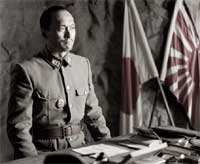 |
 |
When I was young I had such a vision of myself. I dreamt I'd be someone to be reckoned with, you know, in the world. But one learns one's scale. I've such a dread of ending my days alone. Recently, I've allowed myself to think that I may not be. Am I wrong?
-- Barbara Covett, Notes on a Scandal
Nothing seethes like a good claustrophobic British drama, and this film, based on the Zoe Heller book, is like a two-hour sneer. Patrick Marber (Closer) wrote the screenplay for this one, and like the Mike Nichols adaptation of Closer a few years back, following the characters' progress in this film is like watching bugs under the microscope, wriggling away in the final moments before they're squashed.
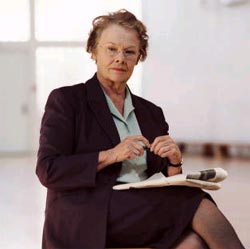 |
Just vague enough to be desireable, twisting stray strands of hair in her fingers, eager to please her new colleagues and carrying the whiff of her younger, rebellious, flower-power days about her, Sheba is as tasty a morsel in Barbara's eyes as can be imagined. Even as Barbara becomes abashed and solicitous with her newfound friend, entertaining visions of days forever spent with Sheba at the cafe, or eating supper with Sheba's rumpled husband Richard (Bill Nighy) and their mentally handicapped son, reality intrudes. Yes, it turns out Sheba has a thing for younger men -- the 15-year-olds, to be exact. As an ongoing tryst with one of her students threatens to derail her career, it provides Barbara Covett (that last name says it all) with an opening to be indispensible. As Barbara tells us, all but rubbing her hands with glee: "With stealth, I might secure the prize long-term, forever in my debt. I could gain everything by doing nothing. "
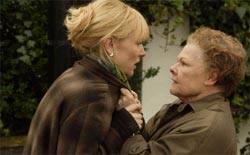 |
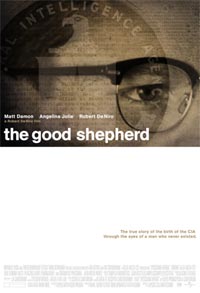 |
You know what I tell people when they ask why I don't use the word "the" when I talk about CIA? Do you put a "the" in front of God?
-- Richard Hayes, The Good Shepherd
Bobby DeNiro directing an epic about the skullduggery-laced history of the CIA? To people who had resigned themselves to seeing DeNiro in such fare as Meet the Fockers, this must have sounded like a blast of fresh air. Count me among them, and I went into this one looking forward to a well-acted, literate, bracing account of our country's secret service, something that would satisfy the heart as well as the head. When the first images of the film wash over us -- a pinched Matt Damon as CIA officer Edward Wilson holding cryptic conversations with operatives and managing the Cuban missile crisis even as a mysterious reel of film shows up on his doorstep -- we're primed to see a good mystery unfold, tendrils of plot and conspiracy ready to unwind over the next few hours.
Alas, not meant to be. Unquestionably ambitious, with its heart in the right place, The Good Shepherd never reaches liftoff. Its scope is immense and mirrors The Godfather in its hero's progress -- beginning with the ascension of Wilson to Yale's Skull and Bones society in the 30s, the film follows him as he is recruited to the fledgling OSS (the future CIA) and manuevers his way to the top chain of command, and stands back and watches as he sacrifices loved ones, honor, and morality to ensure the safety of the family, er, I mean U.S. government ...
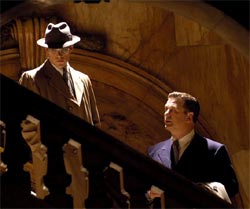 |
You would figure that with a subject like the CIA, it would be easy to be overwhelmed by the sheer volume of material, and that seems to be what's happened here: both overstuffed and undernourished, the film races through events and personal crises like nobody's business. Individual moments rise above the murk every so often -- the interrogation of a Soviet defector who may or may not be a double agent has some bite, and when a character gets thrown out of an airplane without a parachute, the assassination has a shocking suddeness to it. But what's lacking is a sense of order or dynamics -- when everything is given the same emphasis and pace as everything else, there's little to hold onto.
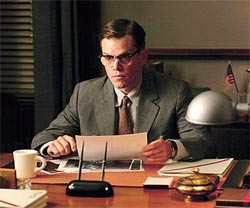 |
 |
It's a shame that The Good Shepherd isn't anywhere near as incisive or gripping as it wants to be -- in the current political climate, there's no doubt a great movie waiting to be made about how America got to where it is now, and how choices in the past determined the tragedies of the present. Unfortunately, this film isn't it.

